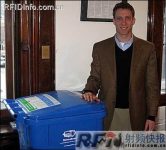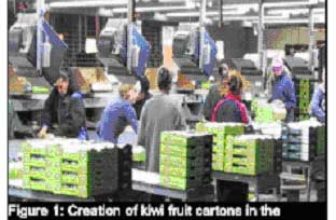
U.S. food suppliers use RFID technology to drive consumers to participate in waste recycling
[ad_1]
American Kraft Foods Corporation (Kraft) formulated the item recycling program and made the following regulations: RFID technology tracks the use of empty containers and provides material incentives to consumers who participate in item recycling. Kraft Foods is the official food supplier of RecycleBank. Kraft’s customers are on all continents in the United States. The company mainly uses the following technology: When recycling trucks collect garbage, use RFID technology to weigh the recycling bins and record the past user. The user can download cash coupons or other lottery tickets from the Internet based on the RFID record. The amount of cash or lottery tickets depends on the amount recovered.
RecycleBank claims that it hopes to cooperate with some companies that have made outstanding contributions to environmental protection and are leaders in choosing a company from each industry and giving it the title of “official sponsor”. Kraft Foods mainly sells products including the Kraft brand and well-known brands such as Maxwell House coffee and Planters nuts. In recent years, Kraft Foods has spared no effort in reducing environmental pollution and advocating green environmental protection. One of them is their exploration and efforts in product packaging.

Ron Gone displays RFID recycling bins
Using RFID recycling bins, consumers can put newspapers, cans, glass bottles, plastic containers and other recyclable items in them, put the recycling bins on the side of the road, and the recycling trucks will transfer the bins away.
Elisabeth Wenner, Secretary of the Sustainability Department of Kraft Foods, said, “We are looking for ways to reduce the use of packaging. Packaging will eventually be treated as garbage. Encouraging recycling can help Kraft reduce the amount of packaging used by the company itself or other companies. RecycleBank has discovered an effective method. This method is to provide material rewards to consumers who participate in recycling items. This method is simple and practical to operate.”
Gonen, the founder and CEO of RecycleBan, said that RecycleBank officially launched the project in Philadelphia in 2006 and has since been promoted in the Eastern Seaboard area. So far, 70,000 consumers have joined the project, and it is expected that there will be 250,000 consumers. participate. The company provides an operating system for the city, this operating system can better improve the existing recycling system. Municipal agencies pay for implementation and use fees, and have the right to decide whether citizens will use it for compensation.
Each participant can get a RecycleBank recycling box. One side of the recycling box is embedded with a 134.2MHz (low frequency/LF) RFID active tag. Consumers put newspapers, cans, glass bottles, plastic containers and other recyclable items in it. Then put the recycling box on the side of the road. The recycling truck will automatically lift the recycling box and put it in the car. An ID card corresponds to the data information of a participant in the RecycleBank system. The RFID tag is responsible for transmitting the ID card data. The boom of each recycling vehicle is equipped with a RecycleBank scale provided by Avery Weigh-Tronix and McNeilus. The RecycleBank ruler can weigh the recycle bin and the recyclables inside.
An RFID detection device (designed by Avery Weigh-Tronix) is installed at the rear of the recycling truck. This device is 12 inches or less from the recycling bin. The device obtains its ID number when the recycling bin is emptied. The computer operating system is connected with the reader and the ruler, and the system records and stores the data of the reader and the ruler. After the recycling vehicle returns to the center, the RecycleBank laptop and transponder receive the data stored in the recycling vehicle and transmit the data to the RecycleBank network server via a wireless device.
After that, consumers can log in to their personal accounts on the RecycleBank website to view their recycling records, as well as data about the amount of oil and trees saved due to recycling. Personal credit records will show the reward points that consumers can obtain based on the amount of recyclables.
Consumers can earn up to 35 RecycleBank bonus points each month, which can be exchanged for discount coupons from local companies and Kraft Foods.
Gonen said that the use of RFID tags has been very effective. Since the use of RFID, RecycleBank has adjusted the system to ensure the shortest reading and writing range. Gonen revealed that if the read-write range is too long, the reader will simultaneously obtain the ID numbers of all recycling bins in the surrounding area. Gonen said, “Accuracy is very important to us. We spend a lot of time developing the best labels.” It is for this reason that the company does not have a fixed label manufacturer. As the order amount increases, products from manufacturers with large production scales will be adopted. Now they are using RFID tags produced by Avery Weigh-Tronix.
According to Gonen, a tag has a lifespan of several years. “We have selected some cities that have almost no recycling systems, and recycled 40% of the garbage generated in these cities.” Those that cannot be recycled are put in landfills for disposal.
The RecycleBank project is currently widely used in more than 35 autonomous regions in Philadelphia, Delaware, Massachusetts, Vermont, and New Jersey, and it is planned to be widely used nationwide by the end of this year. Gonen said that RecycleBank has so far collected nearly 360 million tons of waste from the landfill.
[ad_2]



